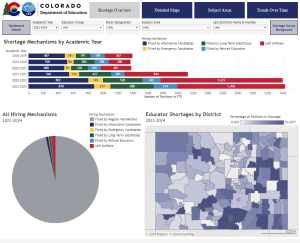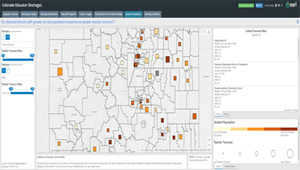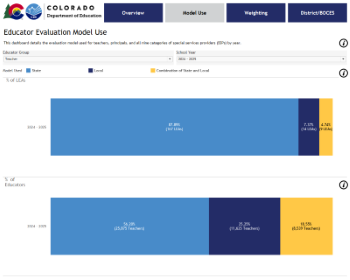You are here
Educator Research and Impact
Research and Impact Office Purpose
The Research and Impact office in Educator Talent uses data to tell the story of the educator pipeline in Colorado with the goal of improving the recruitment, retention and development of quality educators. The team deploys skills in research, analysis, data visualization, communication and collaboration to partner with internal and external stakeholders in understanding current challenges, designing interventions and measuring impact.
Questions?
Please contact us at EdTalentResearch@cde.state.co.us
You may also find team member contact information in the CDE directory (choose Educator Research and Impact from the drop-down menu)
Educator Workforce Dashboards
Educator Preparation Program Report
The Colorado Educator Preparation Programs report (EPP Report) provides information about the effectiveness of programs that train teachers, principals and special services providers in our state.
Learn more about the EPP report
Educator Shortage Survey
Annually, the Division surveys all school districts and BOCES to identify the number of positions filled by specific shortage mechanisms (including hiring long-term substitutes, retired educators, alternative licensure program candidates and emergency authorization holders), the number of positions that went unfulfilled and recruiting strategies used.
Learn more about the Educator Shortage survey
Colorado Educator Workforce Geographic Information Systems Maps
CDE and the Region 12 Comprehensive Center have collaborated to create a new customized geographic information system (GIS) map that displays data and connections among district educator shortages, educator preparation program enrollment and completion, district retention and attrition rates, and other contextual economic data (e.g., median local income and employment rates).
Educator Effectiveness Assurances
The Educator Effectiveness (EE) assurances display data on educator evaluation models used across the state including: (1) the educator evaluation model used to evaluate teachers, principals, and all nine categories of SSPs; (2) for those educators evaluated using the state model evaluation system, the weights assigned to the four professional practices quality standards defined in rule; (3) the implementation of the Advisory Personnel Performance Evaluation Council (also referred to as the 1338 Committee); and (4) the date by which all educators will be trained on the system that will be used for their evaluation.
Learn more about EE Assurances
Educator Effectiveness Metrics
Released annually, the Educator Effectiveness (EE) Metrics reflect performance evaluation ratings for teachers and principals for at least the three most recent years for which CDE has data. Data for the current evaluation frameworks can be found in the dashboard below. Data from previous frameworks can be found at SchoolView Data Center.
Additional Reports and Tools
Evaluation Reports of Educator Recruitment and Retention Efforts
In response to the teacher shortage in Colorado, the legislature has created a number of grants and programs designed to help recruit and retain teachers. To monitor the progress of legislative efforts to address the teacher shortage, Educator Talent releases annual progress evaluations for the following grants and programs:
- Teacher of Record License and Program
- Quality Teacher Recruitment Program
- Teacher Residency Expansion Program
- Educator Recruitment and Retention Financial Assistance Program
Educator Preparation Program Initial Completers Survey
In partnership with the Collaboration for Effective Educator Development, Accountability, and Reform Center (CEEDAR) and the Colorado Preparing Excellent Educators and Leaders Network (CO-PEEL), the Colorado Department of Education (CDE) developed and administered an Educator Preparation Program Initial Completers survey to provide insights into new educators’ perceptions of their preparation program. The first administration was in the summer of 2024 for teachers who received an initial license in the 2023-24 school year. Both a summary report and a technical report are available. CDE plans to administer the initial completers survey annually with an additional survey in future years when educators move from an initial teaching license to a professional license.
Educator Turnover Rates and Other Colorado Staff Data
Staff turnover data are important to consider because of the costs to fill positions and because of the loss overall in the workforce when educators leave the profession. Teacher, principal and special services provider turnover rates are produced for all districts annually, along with staff diversity and salary. Visit CDE's School District Staff Statistics webpage for more information.
Teacher Recruitment and Retention Survey (TRR)
In partnership with the Colorado Department of Education and REL Central, the Research and Impact team developed and administered the Teacher Recruitment and Retention Survey (TRR) as part of the Teaching and Learning Conditions Colorado (TLCC) survey administration in the spring of 2024. The survey was created after a thorough review of existing research and a series of focus groups on the question, “What factors are related to teacher recruitment and retention, particularly for teachers of color?” The report with additional findings can be found here and the detailed responses for each question can be found as part of the statewide reporting on the TLCC survey with Panorama.
The Impact of Colorado Housing Costs on Teachers
The Keystone Policy Center looked at the relationship between teacher salaries and home prices across Colorado’s 178 school districts. An interactive map allows users to see the median salary and available affordable housing in every Colorado school district for 2007, 2015, and 2021. We recommend using this map in tandem with the Educator Workforce GIS maps to inform conversations about educator recruitment and retention.
Teaching and Learning Conditions in Colorado (TLCC) Survey
The TLCC is a statewide, confidential survey intended to support school, district, and state improvement planning, as well as research and policy. An interactive report showing TLCC survey results for schools and districts across the state is available on the TLCC Survey webpage.





Connect With Us





